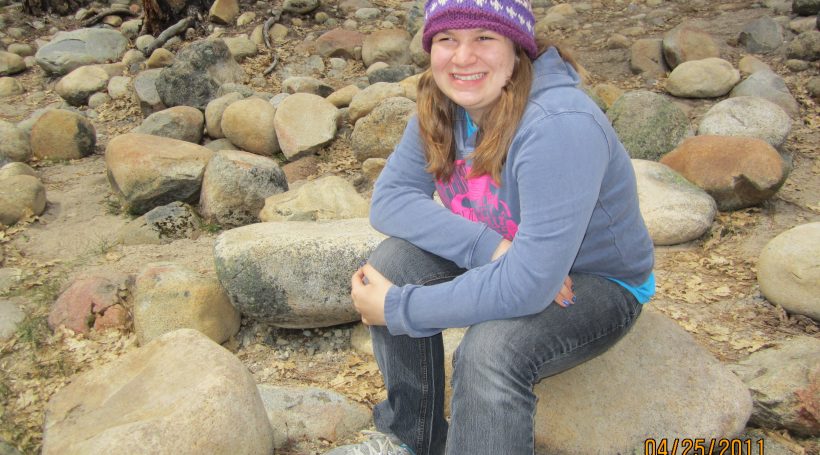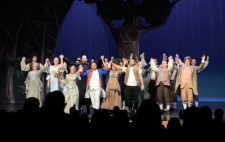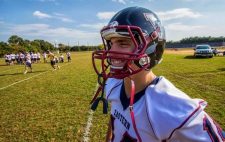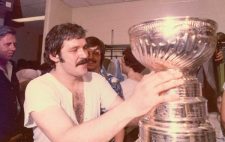Thirteen-year-old Deanna Greco is a bright feisty teenager from Cherry Hill who loves the arts, does well in school and is a long-time member of her local swim team. Despite her typical teenage existence, she is also dealing with a very mature disease: Cone-Rod Dystrophy. This genetic disorder is slowly stealing her eyesight. She doesn’t know when – or if – she will lose her sight completely, but she says she considers every day she can see as a blessing.
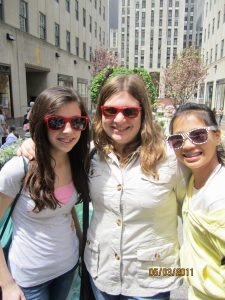
Deanna with friends in New York City
What happened to your eyesight?
On the first day of school in third grade, I couldn’t see the board. Figuring I needed glasses, my mother took me to a pediatric ophthalmologist. The doctor knew there was a greater problem, so we visited a pediatric neuroophthalmologist and we found out I had Cone-Rod Dystrophy, a genetic progressive disease that often results in blindness. My vision has been decreasing since I was born, but I didn’t realize it. I’ve noticed a big decline in the past two years.
You have 20/400 vision now, which can’t be helped by corrective lenses. What are the technologies that allow you to see and read?
I use a machine that has a screen with a tray underneath it. I put whatever I want to read under it to magnify it. I can do my schoolwork, and I have wonderful grades. I can’t complain at all. The work to me is simple, but time-consuming. I’m used to it.
There’s no cure for your disease. Do you think one day you’ll lose your sight completely?
I’m hopeful for a cure. I don’t know when or if I’ll lose my sight completely. I just pray that I don’t. That’s the reason I live the way I do – living every day to the fullest. I want to see as much as I can before I lose it, if I lose it.
What is your greatest fear?
I don’t have many fears. My greatest fear, and probably only fear, is going to bed and waking up in the morning not able to see. That would be so devastating to me, but I’d overcome it.
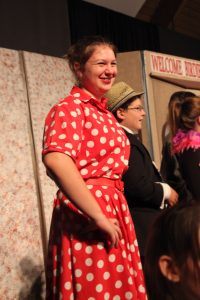
Deanna in Moorestown Theater Company’s production of “Bye, Bye Birdie”
Writing and acting are your passions. Why are they so important to you?
Writing is most important to me because I write to help people. I like to write inspirational poems, which people can look at and put to their own story. I write about following your dreams and being who you are because that is my philosophy on life and what I’d like other people to live by. Acting allows me to put myself in someone else’s shoes and walk around in them. I get to pretend. I enjoy that. I just finished appearing in “Chitty Chitty Bang Bang” at Moorestown Theater Company.
You also swim competitively. Is that challenging?
Swimming is the one sport I have left.
I used to be sports crazy and played every sport. About two years ago I stopped basketball because I just couldn’t see enough to play. Swimming is the one thing I can do because you don’t have to see to swim. I’ve enjoyed swimming for years now, so it’s not something that came after losing my vision. The hardest part is being scared of hitting the wall. I’m going to start using a device called a tapper for people who can’t see. It allows someone to tap the competitive swimmer before she gets to the wall to let her know it’s time for the flip turn. I never wanted to use it before because it made me feel different. Now I don’t mind.
Do you think your poor eyesight has made other senses stronger?
Definitely. My sense of hearing is outstanding and my sense of touch is really good. I learned Braille and if I didn’t have this sense of touch, I don’t think I would have gotten anywhere with it.
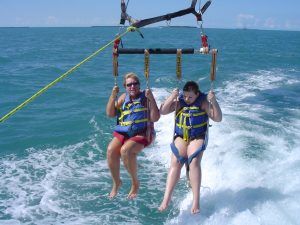
Greco and her mom parasail off the Florida Keys
How do you maintain such a positive attitude?
I don’t look at my vision as something that’s bad. You see so many things in the world that are tragic. Comparing them to what I have makes it seem so insignificant. It’s sad and sometimes I get upset over it, but most of the time I just like to stay happy. There’s no reason not to be happy. I’m alive. I can think. I’m smart, and I have a wonderful family. I stay positive because it’s a better way to live. I want others to be positive. It’s a domino effect – when one person’s happy, other people are happy.
Does knowing you might lose your sight make it harder?
I think it’s good that I know. It’s part of life. It gives me the opportunity to live my life to the fullest. I travel a lot now. I go to a lot of concerts, and do a lot of visual things in case it does happen.
Losing my vision has helped me look at others with a more positive perspective. I don’t want to judge people, and I think everyone is equal. I want to help and inspire people through my writing. My advice for others is just to be happy and shoot for your dreams and not give up.
Can you tell us about your work with VisionWalk?
I’m participating in a 5K VisionWalk for the Foundation Fighting Blindness to raise money for research for retinal degenerative diseases. It will be on October 22 at Independence National Historical Memorial Park in Philadelphia. I’m going to speak at the event. To support our team visit visionwalk.org, go under Philadelphia, and our team is Deanna’s Angels.


